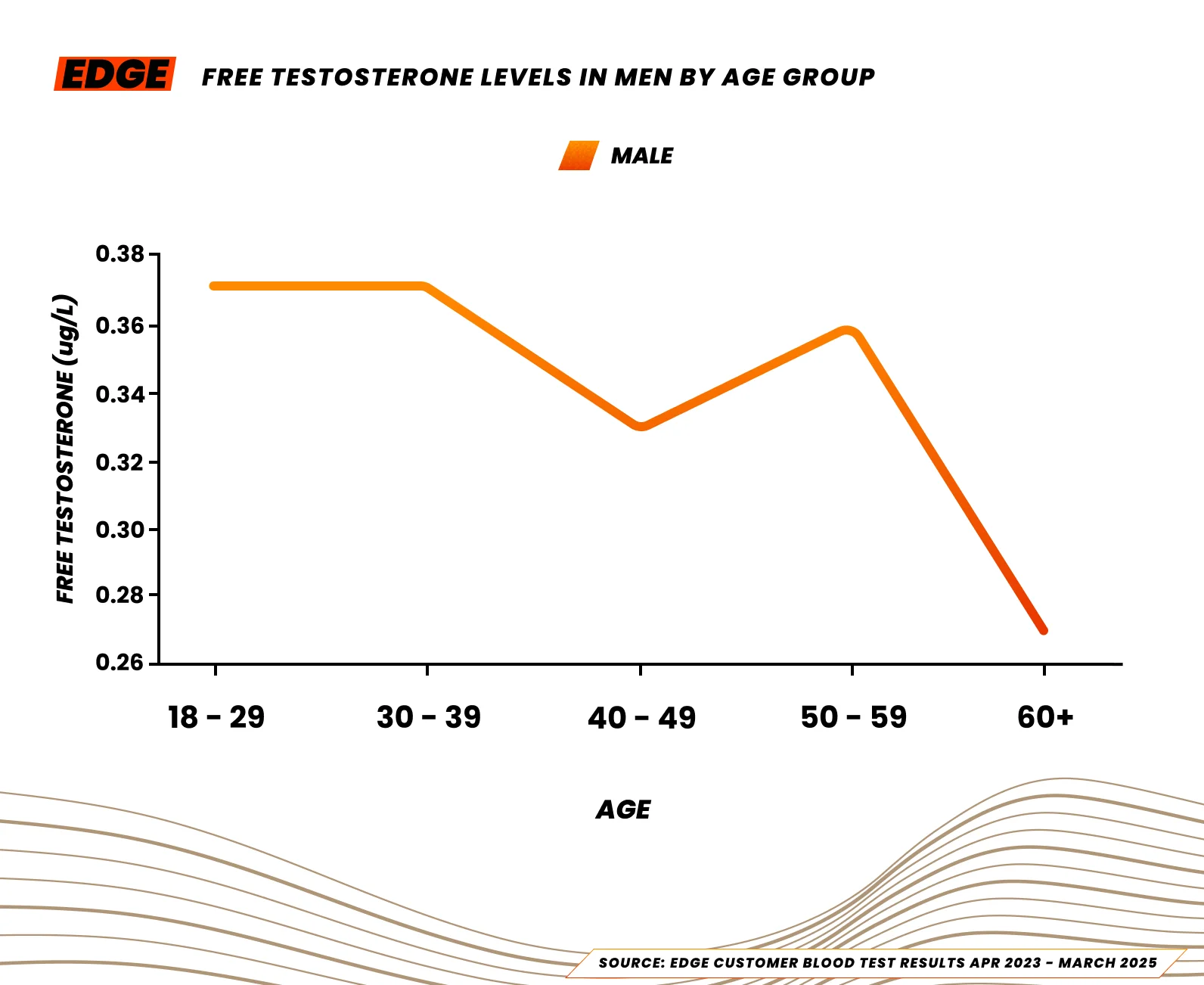What is Free Testosterone & why is it important for athletes?
1 min read
Published on
May 22, 2025
Written by
EDGE
Share this article
What Is Free Testosterone?
Testosterone is a key anabolic hormone that supports muscle growth, strength, energy, and recovery. “Free testosterone” refers to the active form circulating in your blood, which is available to tissues and responsible for its performance-enhancing effects.
For athletes, free testosterone levels provide a clearer picture of hormonal status than total testosterone alone, especially when symptoms like fatigue, low strength gains, or poor recovery arise.

"Free testosterone represents the biologically active portion of testosterone that influences muscle growth, libido and recovery. For athletes with symptoms of hormonal imbalance or unexplained fatigue, testing free testosterone alongside total testosterone and SHBG offers a clearer picture of hormonal availability and action."
Why Testosterone Is Essential for Performance
-
Muscle Mass & Strength
Testosterone stimulates muscle protein synthesis, making it essential for building and maintaining lean mass. Low free testosterone levels can stall strength gains and muscle repair.
-
Recovery & Adaptation
Adequate testosterone levels support quicker recovery from training and reduce the risk of muscle breakdown or overtraining.
-
Energy & Mood
Low free testosterone can cause fatigue, mood swings, and reduced motivation, all of which affect training consistency and competitive mindset.
-
Bone Health
Testosterone supports bone density, protecting against stress fractures, especially in endurance athletes.
What are normal free testosterone levels for athletes?
We looked at blood test data from EDGE customers and found the median free testosterone levels for men are 0.36 nmol/L.
Here is a breakdown of free testosterone levels by age:
| Table 1: Free Testosterone Levels in Men by Age Group (ug/L) | |
| Age Group | Male |
| 18-29 | 0.37 |
| 30-39 | 0.37 |
| 40-49 | 0.33 |
| 50-59 | 0.36 |
| 60+ | 0.27 |
Source: EDGE customer blood test results Apr 2023 – March 2025.

Who’s at Risk of Low Free Testosterone?
-
Male endurance athletes with high training loads and low energy availability
-
Athletes under chronic stress or sleep deprivation
-
Those with very low body fat or restrictive diets
-
Men over 30, as natural testosterone declines with age
-
Athletes using performance supplements or anabolic agents (which can disrupt hormonal balance)
Symptoms of Low Free Testosterone in Athletes
-
Reduced strength and muscle mass
-
Slower recovery and frequent injuries
-
Persistent fatigue or low energy
-
Decreased libido and mood changes
-
Difficulty making training gains despite consistent effort
These signs are often overlooked or attributed to overtraining but may point to hormonal imbalance.
Why Test Free Testosterone?
-
To identify hidden reasons behind underperformance or fatigue
-
To distinguish between total testosterone and bioavailable (active) levels
-
To assess the impact of training, diet, or lifestyle on hormone health
-
To inform recovery strategies, nutrition plans, and training volume
Free testosterone testing is particularly useful when total testosterone is borderline, as it provides a more accurate view of what's functionally available.
How to Support Healthy Testosterone Levels
-
Get 7–9 hours of quality sleep per night
-
Avoid excessive cardio without adequate fuelling
-
Incorporate resistance training into your routine
-
Ensure dietary fat and zinc intake are sufficient (avocados, eggs, red meat, nuts)
-
Reduce alcohol, chronic stress, and overtraining
-
Include rest blocks and recovery strategies
In Summary
-
Free testosterone is the active form crucial for strength, recovery, and energy
-
Low levels can limit performance, even when total testosterone appears normal
-
Testing reveals if your hormone health is supporting - or hindering - your training
-
Lifestyle, nutrition, and recovery all influence levels
Check Your Free Testosterone Levels
Understand your hormonal baseline to build strength, avoid burnout, and maximise your athletic potential.
Get 10% off your first order
Want regular tips on how to make the most of your results? Join our newsletter and we'll give you 10% off your order!
Get the knowledge
Get expert advice to help you improve your results.
Go to our knowledge center


